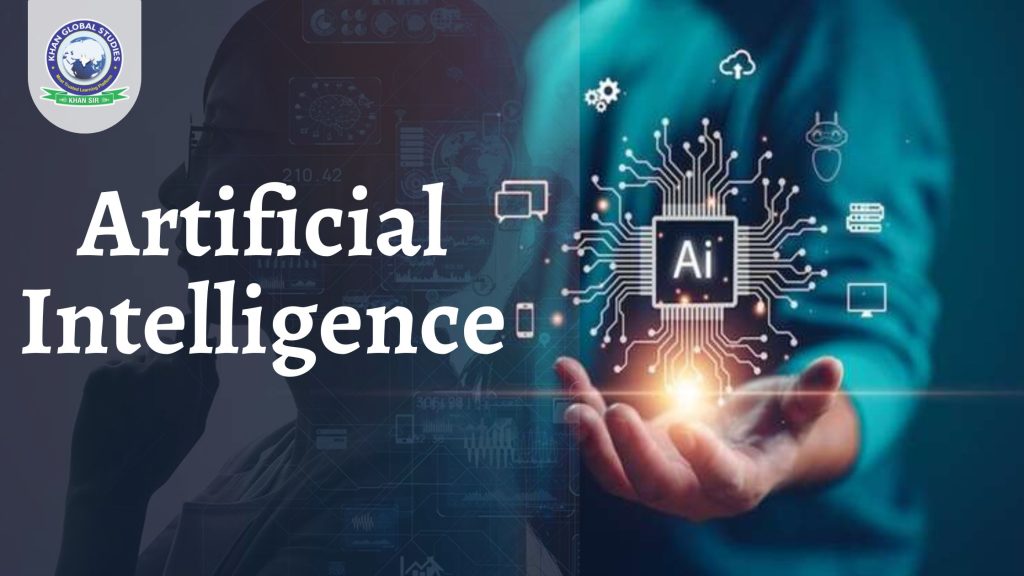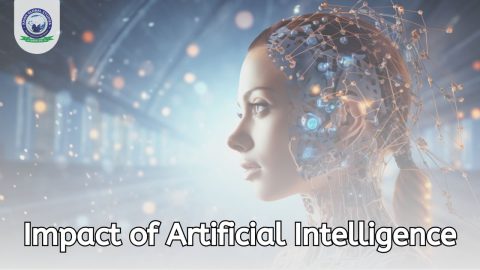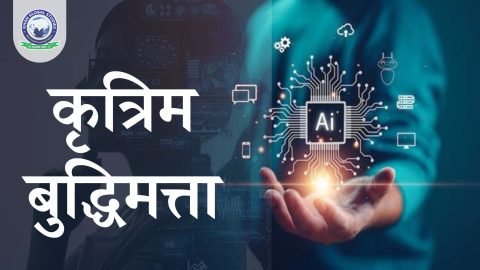Artificial Intelligence is a branch of computer science that enables machines to mimic human behaviour. AI can improve upon its previous versions, making it smarter and more aware, and it can continuously improve its abilities and knowledge. Through AI, machines perform cognitive functions such as learning, planning, reasoning, decision-making, and problem-solving. AI is a machine simulation of human intelligence and can solve major real-world challenges.
- Machine Learning:- Machine learning is a technique of computer programming in which computer programs are designed so that the program can learn new things by itself and make any decision by itself when needed.
- Deep Learning:- Deep learning is a machine learning technique through which we teach the computer what the human is doing.
- Need for Clean Data: The industry believes that to create solutions for all sectors, clean data will be needed first and the government will have to take appropriate steps in this direction.
- Technological Singularity: By 2045 machines will be able to learn and improve themselves and think, understand and act at such a high speed that the path of human development will be changed forever.
History of AI
The history of artificial intelligence is a fascinating journey. From ancient myths of artificial beings to the formal establishment of the field at the Dartmouth Conference in 1956, AI has experienced periods of great optimism and subsequent “AI centuries”. Early successes with expert systems were followed by challenges, which led to a resurgence with the revolutionary impact of statistical machine learning and deep learning. Today, AI is deeply integrated into our lives, powering everything from search engines to self-driving cars, and continues to evolve rapidly.
- 1935:- Turing described an abstract computing machine with infinite memory and a scanner.
- 1950:- Turing test by Alan Turing.
- 1951:- The first program of artificial intelligence was written by Christopher Strachey.
- 1956:- Scientist John McCarthy defined the term artificial intelligence in 1956 as the science and engineering of creating intelligent machines.
- 1960:- John McCarthy developed the programming language LISP. That is why John McCarthy is called the father of artificial intelligence.
- 1973:- Alain Colmerot of France developed the logic program language (PROLOG).
- 1973:- The Assembly Robotics Group of the University of Edinburgh built the Edinburgh Scottish robot Freedy.
- 1981:- Japan launched a scheme called Fifth Generation.
- Elvi:- For this, China created a project named ‘Elvi’. Britain created a project named ‘Elvi’ for this.
- Esprit:- The countries of the European Union also started a program named ‘Esprit’.
- 1983:- Some private organizations together established ‘Micro-Electronics and Computer Technology’ to develop advanced technologies applicable to Artificial Intelligence.
- 1990:- Dr. Cynthia Bresel at MIT created an emotional robot named Kismat, which got its name registered in the Guinness Book of World Records.
- 1997:- Deep Blue was an AI-based chess computer. It defeated the then-world champion Gary Kospor.
- 2010:- Microsoft launched a gaming device named Xbox 360.
- 2010:- DeepMind was a British company, founded in 2010. Its headquarters is in London. In 2014, the American company Google bought it and it was named ‘Google DeepMind’.
- 2011:- Apple invented the AI-based virtual voice Assistant SIRI.
- 2014:- Amazon launched AI-based virtual voice assistant ‘Alexa’.
- 2016:- Google’s AlphaGo defeated Korean Lee Seol, one of the most prominent players of Go.
- 2016 (May 18):- Google created Google Assistant.
- 2016:- The human-like intelligent robot known as Sophia was developed in 2016 by David Henson, CEO of Henson Robotics Company in Hong Kong. The (human-like) intelligent robot known as Sophia was developed in 2016 by David Henson of Henson Robotics Company in Hong Kong.
- 2017:- The world’s first robot police officer, Robocop, inducted into the Indian Police Force.
- 2017:- Microsoft has launched a deep learning acceleration platform called “Project Brainwave”, which is based on FPGA (Field Programmable Gate Array) infrastructure for real-time artificial intelligence (AI).
- 2017 (April 21):- Samsung launched AI-based virtual voice assistant ‘Bixby’.
- 2020:- Microsoft launched the Turing Natural Language Generation Tool.
Types of Artificial Intelligence
Artificial Intelligence refers to something that is created by humans or non-natural things and Intelligence means the ability to understand or think. AI is not a system but it is implemented in systems. There are many different types of AI, each with its strengths and weaknesses.
Based on the capabilities of AI – Type 1
- Narrow AI: Narrow AI is also known as weak AI or narrow AI. Narrow AI is designed and trained on a specific task or a narrow range of tasks. These narrow AI systems are designed and trained for a purpose. These narrow systems perform their specified tasks but cannot mainly generalize tasks. Personal virtual assistance like Alexa or Siri, recommendation systems, image recognition software, and other language translation tools.
- General AI: It is known as strong AI. It refers to AI systems that have human intelligence and the ability to perform various tasks. The system can understand, learn and apply a wide range of techniques similar to the way humans adapt to different tasks. General AI remains a theoretical concept, and now no AI can achieve this level of intelligence.
- Super AI: It is known as super-intelligent AI that surpasses human intelligence in problem-solving, creativity and overall abilities. Super AI develops its own emotions, desires, needs and beliefs. They are capable of making their own decisions and solving their problem.
Based on the Functionality of AI- Type 2
- Reactive Machines: Reactive machines were created by IBM in the mid-1980s. These machines are the most basic type of AI systems. This means they cannot form memories or use past experiences to influence the choices they make in the present, they will only react to the conditions currently present so one current type of reactive machine is Deep Blue, which is a chess game played by supercomputers. These are the most basic types of AI and can only react to the environment, they cannot form memories or make decisions based on past experiences. Examples include simple rule-based systems like chess-playing programs.
- Limited Memory: This includes machine learning models where the device gains knowledge from previously learned information, stored data, or events. Unlike reactive machines, limited memory learns from the past by observing the actions or data given to them to create experiential knowledge.
- Theory of Mind: This type of AI has decision-making capabilities quite close to the limitations of the human mind but by machines. While some machines currently exhibit human capabilities like voice assistants, for example, none are fully capable of carrying on a conversation relative to human standards. One component of human interaction includes emotional capabilities, or the ability to speak and behave in a conversational standard AI system that can understand and simulate the mental states of other agents with a theory of mind. This type of AI is still in development and is not yet practical.
- Self-Awareness: This AI involves machines that have human-level consciousness. This type of AI is not currently living, but it would be considered the most advanced type of AI known to man. These AI systems have consciousness and self-awareness, but it is currently the stuff of science fiction and has yet to become a reality.
Applications of Artificial Intelligence
Artificial intelligence (AI) has seeped into almost every aspect of modern life, revolutionizing industries and reshaping the way we live and work. Here is a glimpse of some of its major applications:
Healthcare
- Diagnosis: AI-powered systems can analyze medical images such as X-rays and MRIs to detect diseases early.
- Drug Discovery: AI speeds up drug development by predicting molecular interactions and identifying potential drug candidates.
- Personalized Medicine: By analyzing patient data, AI can tailor treatment plans for individuals.
Finance
- Fraud detection: AI algorithms can identify fraudulent transactions in real time, protecting financial institutions and customers.
- Algorithmic Trading: AI-powered systems can make trading decisions at a faster pace based on market data analysis.
- Risk Assessment: AI helps assess creditworthiness and investment risks.
Transportation
- Self-driving Cars: AI is at the core of autonomous vehicles, enabling them to understand their environment and make driving decisions.
- Traffic Optimization: AI can analyze traffic patterns to optimize traffic flow and reduce congestion.
Customer service
- Chatbots: AI-powered chatbots provide instant customer support, answering queries and resolving issues efficiently.
- Recommender Systems: AI suggests products or services tailored to individual preferences by analyzing customer behaviour.
Entertainment
- Content Recommendation: AI-powered algorithms suggest movies, TV shows, and music based on user preferences.
- Virtual Assistants: AI-powered assistants such as Siri, Alexa, and Google Assistant provide information, control smart devices, and entertain users.
- Game Development: AI is used to create intelligent game characters and environments.
Agriculture
- Precision Farming: AI analyzes data from sensors and satellites to optimize crop yields, water use, and pesticide use.
- Crop Monitoring: AI can detect diseases and pests early, allowing for timely intervention.
Education
- Personalized Learning: AI-powered platforms can adapt to the learning style and pace of individual students.
- Intelligent Learning Systems: AI can provide personalized teaching and feedback.





